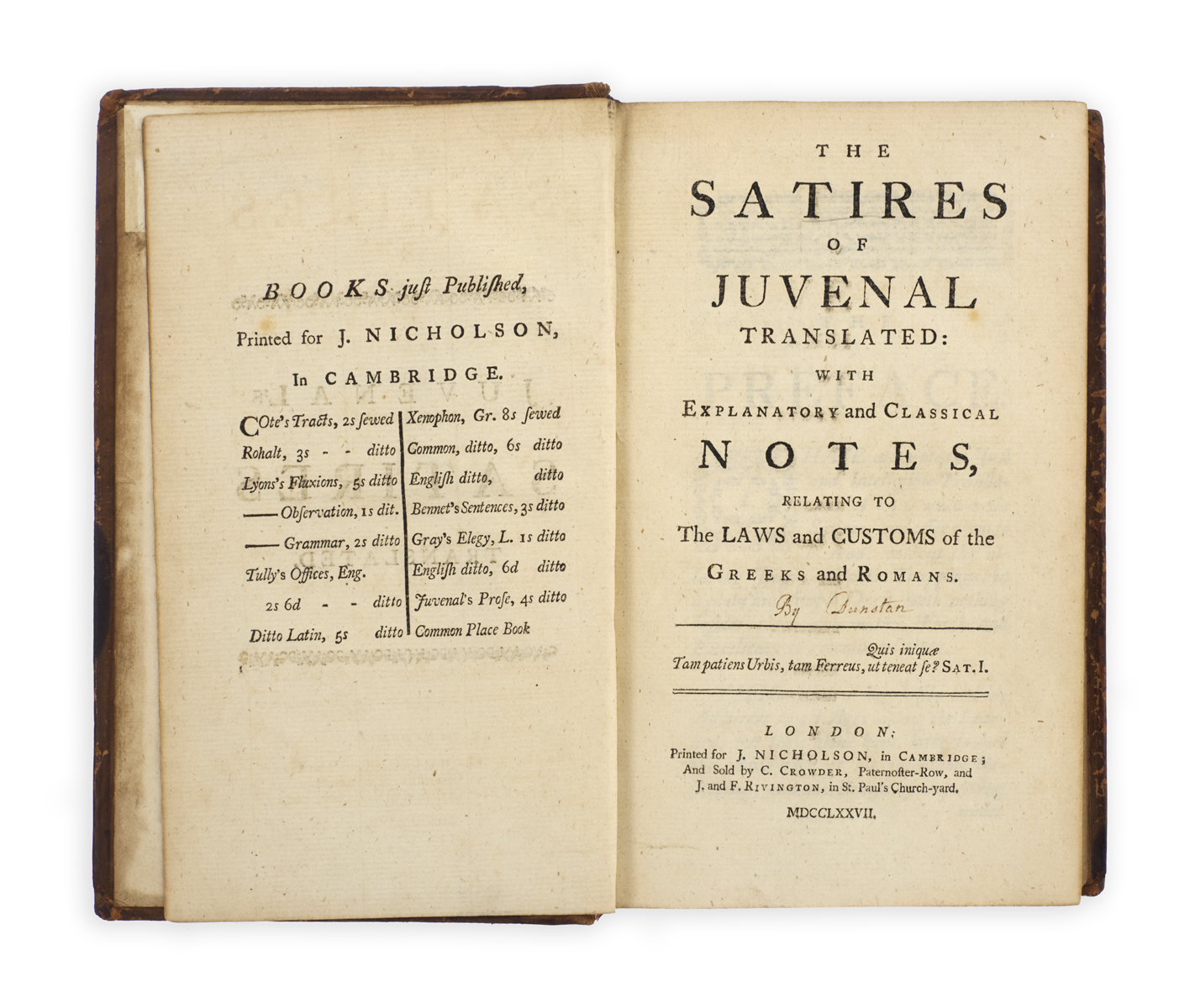ANNOTATED, WITH REFERENCES TO THE WEST INDIES
JUVENAL.
The Satires … translated: with explanatory and classical Notes, relating to the Laws and Customs of the Greeks and Romans …
London: Printed for J. Nicholson, in Cambridge; and sold by S. Crowder … and J. and F. Rivington … 1777.
8vo, pp. xvi, 416, with a half-title; English and Latin texts printed on facing pages; a very good copy in contemporary mottled calf, rebacked; armorial bookplate of Sir Thomas Hesketh, third baronet (1777–1842), booklabel of Easton Neston Library; with scattered contemporary underlining and marginal annotations throughout.

Added to your basket:
The Satires … translated: with explanatory and classical Notes, relating to the Laws and Customs of the Greeks and Romans …
Third edition of this parallel-text translation edited by Thomas Sheridan, first published 1739.
Contemporary annotations (one is dated 1779) provide succinct summaries of the subject of each satire. Satire II for example ‘scourges the Hypocrisy, Effeminacy, & Bestiality of his Countrymen, as contradistinguished from the vilest & most libidinous Turpitude of Women. He is particularly severe upon that abominable intercourse between the male Sex, which was then highly fashionable.’
Several marginal notes point to the annotator having spent time in the West Indies: on p. 42 a reference to a beauty treatment of bread and asses’ milk has the footnote: ‘It is a custom with some of the Ladies at Montserrat … to retire for a fortnight to refresh, as they call it. The discipline is exceedingly severe. They run their faces over with ye oil of ye cushoo [cashew] nut. This lying on for a fortnight brings off all the skin of their faces like a mask’. Elsewhere (p. 172) he notes that the hiring of beadles to lash servants ‘is still practiced in the West India Colonies’; and (p. 174) that a switch of leather ‘is used upon the domestic slaves by their Mistresses in the West India Colonies, & is called a Cow-Skin’.
Other notes seek contemporary parallels for Juvenal’s satire – the circle of hangers-on in Satire V is the same as ‘prevails now at royal Levees, where Courtiers of Distinction form a Circle in the Drawing Room’; in Satire II a reference to adultery (‘Dives erit, magno quae dormit tertia lecto’) ‘is applicable to his present Majesty the Baby King of Denmark with his late Queen & Count Halk’ (i.e. Christian VII, Queen Caroline Matilda, and Struensee); and the shepherd’s cave that opens Satire VI (‘A bitter satire upon the Roman Women. Here the poet is all Nerve, & exuberantly eloquent’) is likened to the ‘social hovel’ in which ‘some of the Highlanders in Scotland live at this day’.
And finally, the annotator glosses the obscene lines ‘Callidus & christae digitus impressit aliptes’, describing an erotic post-exercise massage: ‘the Clitoris – so called from its resemblance to a Cock’s Comb’.






